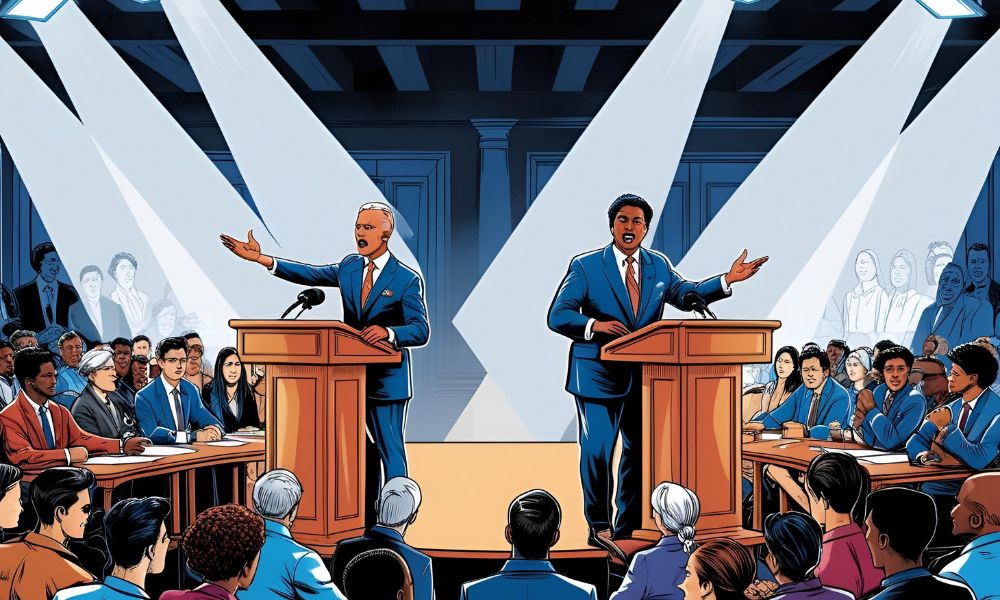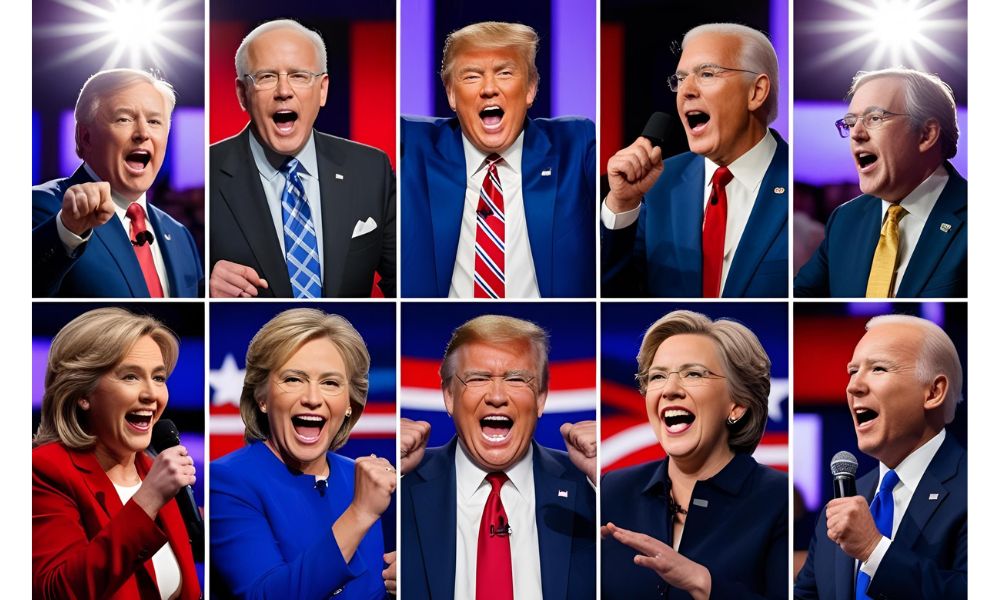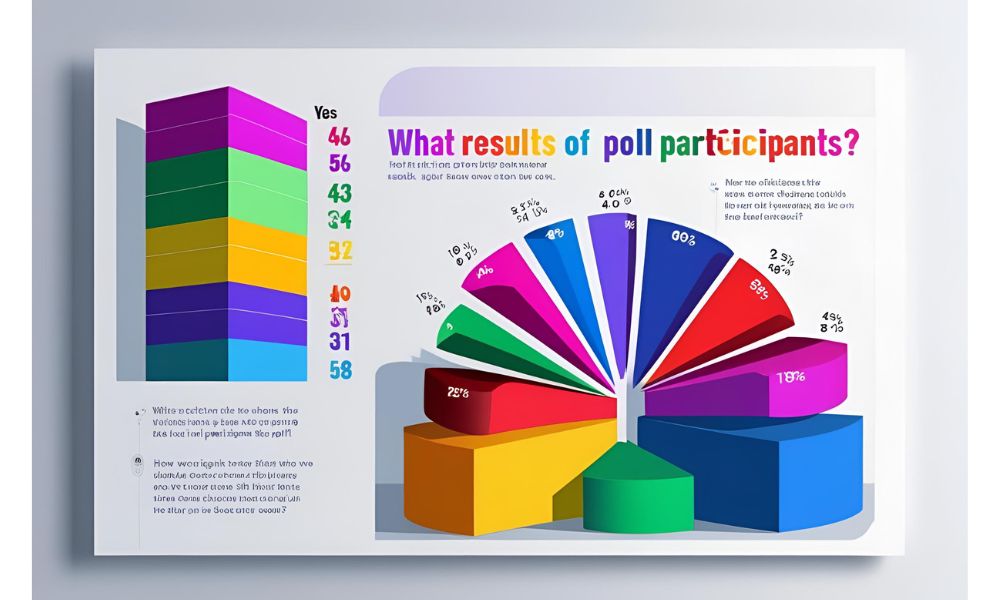As you reflect on the recent debate highlighted by Fox News, it’s clear that Candidate A’s emphasis on economic issues resonated strongly with viewers, while Candidate B’s personal stories sparked engagement despite some policy gaps. The polarized reactions on social media suggest that opinions are far from settled. What does this divide mean for the candidates’ strategies moving forward, and how might it affect voter sentiment in the upcoming elections? The implications are worth considering, as they could shape the narrative in unexpected ways.

Overview of the Debate
The recent Fox News debate featured candidates passionately discussing key issues that matter to voters. From the economy to healthcare, the stage was set for a lively exchange of ideas. You could feel the intensity in the air as candidates took turns addressing pressing concerns, vying for your attention and support. Each contender aimed to highlight their vision for the future, making it clear that they understand the challenges facing everyday Americans.
As you watched, it became evident that the candidates weren’t just reciting scripted lines; they were engaging with one another, challenging opinions, and pressing for clarity on controversial topics. The moderators skillfully guided the discussion, ensuring that each candidate had a fair opportunity to present their stance.
You noticed how some candidates thrived under the spotlight while others struggled to articulate their points, which could impact their standing with potential voters. Throughout the night, you observed moments of agreement and disagreement that illustrated the diverse perspectives within the party.

Key Candidates in Focus
Several candidates stood out during the debate, each bringing unique perspectives and strategies to the forefront.
You likely noticed how Candidate A focused on economic issues, emphasizing tax reform and job creation. Their direct approach resonated with many viewers who are concerned about financial stability.
Meanwhile, Candidate B took a different angle, prioritizing healthcare reform. By sharing personal stories, they connected emotionally with the audience, highlighting the importance of accessible healthcare for all. You could see how their passion drew in support, making a compelling case for their policies.
Candidate C, on the other hand, adopted a more combative style, challenging both opponents and the status quo. Their assertive demeanor might’ve caught your attention, showcasing their willingness to confront tough issues head-on. This strategy could appeal to voters looking for a strong leader.
Finally, Candidate D offered a fresh, optimistic vision for the future, focusing on unity and collaboration. Their inclusive messaging might’ve struck a chord with audiences tired of divisive politics.
Each candidate’s approach provides a clear choice for voters, making this debate a crucial moment in the election cycle.
Memorable Moments Highlighted
Memorable moments from the debate kept viewers engaged and sparked conversation long after the event. One highlight was the unexpected clash between two candidates over their differing approaches to healthcare. You could feel the tension in the air as they exchanged sharp remarks, leaving the audience on the edge of their seats.
Another standout moment occurred when a candidate delivered a powerful personal story that resonated with many viewers. You might’ve found yourself nodding along, feeling the emotional weight of their experience. It humanized the debate, reminding everyone that these issues affect real lives.
The humor that surfaced during lighter exchanges also caught your attention. A well-timed quip about political ads had the crowd laughing, breaking the tension and showcasing the candidates’ personalities. You could sense that the laughter created a more relaxed atmosphere, allowing for genuine connections.
Finally, the closing statements were particularly memorable. Each candidate made a passionate appeal to voters, often referencing key issues that matter most to their constituents. You likely found these poignant moments lingering in your mind, making it clear that this debate was more than just words; it was a pivotal moment in the race.
Expert Opinions From Fox News
Fox News commentators weighed in on the debate, offering insights that helped viewers navigate the candidates’ performances. Their analysis focused on key moments, highlighting strengths and weaknesses in each candidate’s approach.
Many pointed out how Candidate A effectively articulated their vision, connecting with voters on critical issues. You could sense the enthusiasm in their voices as they praised Candidate A’s ability to resonate emotionally.
On the flip side, several commentators critiqued Candidate B’s performance, noting a lack of clarity in policy proposals. They suggested that Candidate B missed opportunities to engage directly with pressing concerns, which may affect voter perception.
You might find it interesting that commentators emphasized the importance of body language, pointing out that Candidate A’s confident stance contrasted sharply with Candidate B’s more reserved demeanor.
Additionally, commentators discussed the effectiveness of the candidates’ rebuttals. They praised Candidate A for countering attacks with poise, while suggesting that Candidate B could’ve been more assertive in addressing criticisms.

Poll Results and Reactions
Following the debate, polls quickly emerged, revealing how viewers responded to each candidate’s performance. You might be surprised by the numbers, as they show a split opinion among the audience.
Candidate A garnered a slight edge, with 45% of viewers declaring them the debate winner. Many cited their strong command of the issues and ability to connect with voters as key factors in this positive reception.
On the other hand, Candidate B received 38% of the votes, with supporters praising their bold responses and engaging demeanor. However, some viewers felt that Candidate B could’ve provided more concrete policy details, which may have hurt their standing in the polls.
The remaining 17% of respondents found it challenging to pick a clear winner, suggesting the debate was more of a draw. This division indicates that while some candidates shined, others still have work to do to win over undecided voters.
As you reflect on these results, consider how they might influence the candidates’ strategies moving forward. These findings not only highlight voter preferences but also set the stage for the next phase of the campaign.
Social Media Buzz
Social media platforms erupted with commentary as viewers shared their thoughts on the debate, creating a whirlwind of reactions. Twitter lit up with hashtags, and you could easily spot trending topics that reflected the public’s mood. Many users took to their feeds to express strong opinions, whether they were cheering for their favorite candidate or critiquing their performance.
On Facebook, lively discussions unfolded in groups, with users posting clips of standout moments and analyzing them in detail. Memes started circulating almost immediately, capturing the more memorable quotes and blunders of the night. You might’ve found yourself scrolling through your timeline, chuckling at the creative takes.
Instagram was no different, with stories filled with reactions and quick polls asking followers who they thought won. Influencers and political commentators weighed in, offering their perspectives that added to the mix of opinions.
You couldn’t escape the buzz; it felt like everyone had something to say. Overall, social media became a vibrant, real-time forum where the debate’s impact was felt far beyond the stage, shaping perceptions and discussions in a way only these platforms can.
Candidate Strategies Analyzed
Candidates often adjusted their strategies throughout the debate, responding dynamically to each other’s points and audience reactions. You could see how each candidate honed in on their strengths, emphasizing their unique policies while trying to undermine their opponents.
For instance, some candidates leaned heavily on personal anecdotes to connect with the audience, making their messages more relatable and memorable. In contrast, others took a more analytical approach, presenting statistics and facts to bolster their arguments. This shift in tactics showcased their adaptability in real-time, as they gauged audience engagement and feedback.
Moreover, you noticed that candidates who seemed to falter early on quickly recalibrated their messaging, often pivoting to issues that resonated strongly with the audience. This ability to pivot was crucial in maintaining relevance and demonstrating their awareness of the debate atmosphere.
Body language also played a significant role; confident gestures and eye contact helped candidates appear more authoritative. As the debate unfolded, it became clear that successful candidates were those who couldn’t only articulate their vision but also read the room effectively, adjusting their approaches to maximize impact.
Voter Perspectives
While watching the debate, you might’ve noticed how voter perspectives shifted based on candidates’ performances. Each candidate’s delivery and engagement style played a significant role in shaping your opinions and those of others around you. When one candidate delivered a compelling argument or connected emotionally with the audience, you could see how their supporters rallied, visibly excited and confident in their choice.
Conversely, when a candidate stumbled or appeared unprepared, you might’ve felt a collective sigh among voters. You probably noticed how quickly opinions can change, as viewers reacted in real-time on social media and in discussions. That’s the power of debates—they can influence perceptions almost instantly.
As the debate unfolded, you may have found yourself reassessing your own views or considering the candidates’ proposals more critically. Voter perspectives are often fluid, and the debate format allows for immediate feedback, both positive and negative.
It’s fascinating to observe how a single moment can shift the narrative, making you wonder about the lasting impact on undecided voters, who are still weighing their options. Ultimately, debates serve as a litmus test for candidates, revealing how well they resonate with the electorate.

Implications for Future Debates
The impact of this debate extends far beyond the stage, shaping expectations for future political discourse. You’ll likely see candidates adopting new strategies based on what resonated with viewers during this showdown. Whether it’s a sharpened focus on specific issues or a change in tone, you can expect future debates to reflect lessons learned here.
Moreover, the way candidates engage with one another will evolve. If one approach proves effective, others will try to replicate it, resulting in a more dynamic exchange of ideas. You might notice increased emphasis on fact-checking in real-time, as candidates realize the importance of staying accountable in an age of misinformation.
Additionally, moderators may adjust their questioning techniques, aiming to promote more substantive discussions rather than allowing candidates to sidestep critical issues. This shift could lead to a more informed electorate, as you’ll have clearer insights into candidates’ positions.
Final Thoughts on the Outcome
Reflecting on the debate’s outcome, it’s clear that the stakes have never been higher for candidates aiming to connect with their audience. Each candidate brought their unique strengths and weaknesses to the table, but it’s you, the voter, who ultimately decides who stood out.
The debates provide a platform for candidates to showcase their policies, charisma, and ability to think on their feet. As you consider who performed best, think about how their messages resonated with your values and concerns.
Did they address the issues that matter most to you? Did they communicate their ideas clearly and convincingly? The effectiveness of their arguments can influence not just your opinion but the opinions of countless others as they head into the polls.
This debate was more than just a contest of wits; it was a pivotal moment that could shape the upcoming election. As you reflect, remember that your engagement and understanding of these debates can empower you to make informed choices.
Don’t underestimate the power of a debate in swaying public sentiment and shaping the political landscape. Your voice matters, and it starts with analyzing who truly won the debate.
Conclusion
In this debate, Candidate A’s strong focus on economic issues clearly resonated with viewers, while Candidate B’s personal stories on healthcare sparked interest but raised questions about policy specifics. As you consider the implications for the upcoming elections, it’s evident that both candidates showcased contrasting strategies that could sway voter opinions. The social media buzz reflects a divided audience, making the next debates crucial for both candidates. Keep an eye on how these dynamics unfold as the election approaches.
